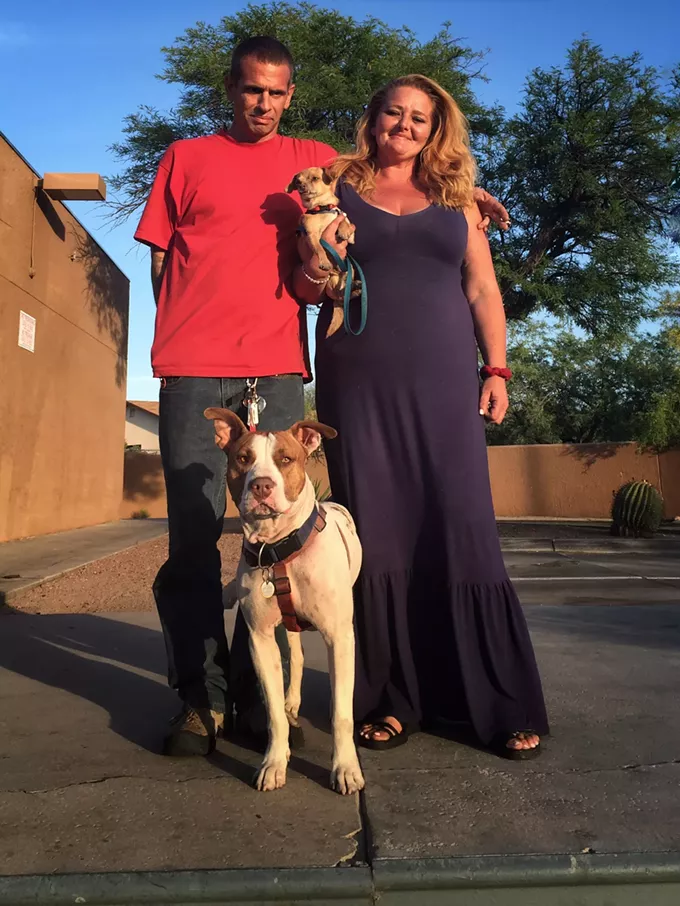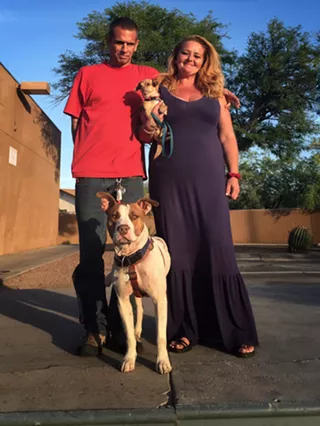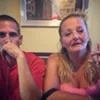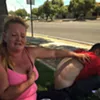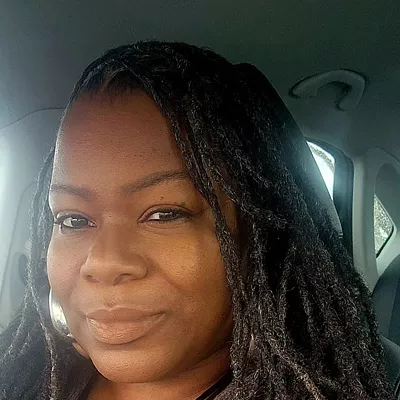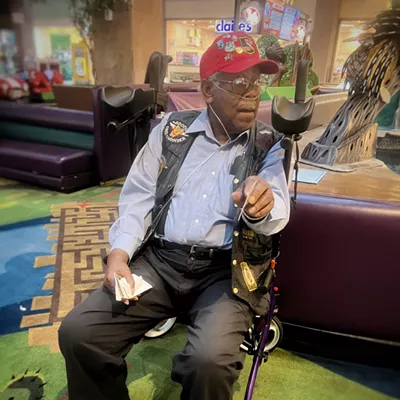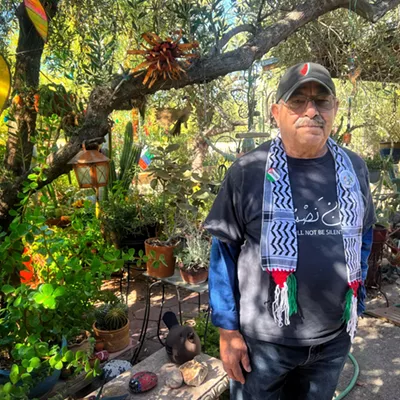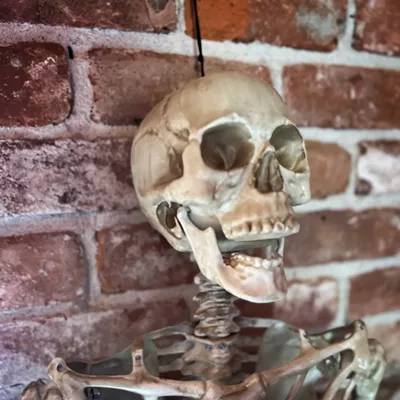Pepper lifts her girlish red dress and with an arthritic finger traces deeply etched lines on her milk-white thighs. Ruddy scars form indecipherable words that could read "helter skelter." She lifts an arm, and the other, and her fingers find more old mutilations that look like coiled up caterpillars and puffed-out butterflies, on wrists, elbows, shoulders and torso.
She gently pushes fingers into her thick blond mane, pushing along her scalp and hairline, and relates harrowing stories of unrestrained binges smoking way too much of the shit, which led to wounds on her head and a deep one below her chin and a permanently hoarse voice.
Doctor's say she's likely suffering congestive heart failure. Just another ailment aligned with her liver disease and blood flow problems, degenerative disc disease and diabetes, the spinal fluid collecting around her brain, the bad knees and holes in her feet.
She can only laugh.
"I swear I'm like patches.”
Her smile shows few askew teeth, defiant gravestones in a derelict cemetery.
Her grin seems effortless, there's no shame here. She's upbeat even, sometimes like a schoolyard girl ready for a future. It's strange, how little cynicism.
Pepper will say she loves life. Still. She'll tell you she loves people. Still. She'll tell you she's grateful to have a place to sleep at night, a floor under a roof and four walls.
Her man John hops down off the wall. Smells of dry sweat. His hunt for rolling papers proved futile. They kiss in the church parking lot shade behind the methadone clinic on 5th Street, where a half-hour earlier they picked up their daily doses. John collects the leashes for their dogs, a pit-bull/terrier mix named Deuce, and Chico, a bouncy, mirthful Chihuahua.
Pepper tenderly strokes the back of his John's neck. Says, "I've never been loved like this in my entire life."
* * * *
The next day Pepper collects trash, cups and wrappers and cigarette butts, from the front of a Circle K and tosses it into the receptacle. In a small way her actions contribute to a greater good, a self-defining deed as a way to not surrender. And a "cleaner world for my children."
John and Pepper occupy the same purgatory 24/7. They live and breathe each other's failures, chaos, and addictions, which are now limited to cigarettes and methadone. Like true lovers, they inhabit each other's fears. All life’s punishments and ignominies and disappointments profuse in a single union. The homelessness and loss and sickness and abject poverty and self-hatred. The shitty parenting, insane circumstances and molestation, and the horror of growing up with an increasing understanding that you're only a speck of some tiny existence the rest of the world wants nothing to do with. Wreaks daily devastation on the human psyche. They're terrified at all times.
And they greet each morning by vomiting hard.
They're sick. Their stomachs are distended because their livers are badly swollen and barely functioning. They each have Hep C. To get off heroin and provide relief from the physical pain and conditions they chose legal, state-funded methadone. They can't do illegal drugs and they're tested, and they've been dropping clean urine.
Methadone is the medicine, as man-made and harsh as it is. It's dated shorthand for heroin addicts with no other options, and it's harder to kick and more brutal than heroin, just ask any junkie. In fact, it's so wretchedly persuasive that if they lessen their doses they get violently ill. If you're as sick as Pepper and John, it's about impossible to wean off of. They've tried. John did it cold turkey once and perishes the thought. Pepper's got a dozen years on methadone, bore three babies on it.
They could use weed to ease the pain, but they're having trouble securing medical marijuana cards because they have no money. Government weed is pricey too when you're jobless and homeless. They can't buy weed on the street because whatever panhandled coin goes for dog food, bus fare and smokes. Packs of cigarettes are riches.
Deuce and Chico don't know the predicament they’re in. They're happy; they play and they snooze. They've water and food and love.
So it'd be really easy to say Pepper Kenney and Johnathan Williams, who were homeless when they met last year at the methadone clinic, are experts at destroying their own forward momentums and livable actions through unconscious self-sabotage. But it's way more than that.
Each was doomed by the time they were six.
Buzz-cutted, sharp-boned 38-year-old John grew up in Virginia. His coal-miner dad died in a mining accident when he was five. Mom never recovered. At 12 he was shooting up morphine, Dilaudid and such. He sold drugs and wrote bad checks and got popped, a lot. His record shows six felony arrests, and prison was home for 13 years of his life. In '05 John's wife suffered a freak aneurysm and died. Two of his children landed in foster care. He has a daughter living with his mother.
John’s kind. It shows quickly once his suspicion of me recedes. The internal hurts are so obvious. And he's no idiot. He's worked jobs in warehouses, in sales, at car washes. He wants to work. He's hoping he lands the job at a pizza place near where they're staying, but nothing’s easy "when you're a six-time felon." Nothing’s ever easy in the afterburn.
Pepper's his recompense, and he can't live without her. And prefers to let her do most of the chatting.
"People have always said that bad things just happen to me," Pepper says, biting into a burger at Carl's Jr. "Like I have a dark cloud that follows me wherever I go ..." In that moment she pulls a long hair from inside her food and drops her shoulders as if to illustrate her point. Her face goes sour. The hair isn’t hers, it’s black. John shrugs and takes the burger to the counter to get a new one made.
"I've been abused by men in some way my whole life," she continues. She looks to John at the counter. "But John is very old-fashioned. He the nicest man I've ever met. He doesn't call me a bitch. He doesn't call me a whore. I used to always have to walk catch-up behind my guys. John walks with me side by side. I mean he cares about me like I've never been cared about before. He carries the backpack and pulls the dog carrier, holds the leashes for both dogs, carries whatever groceries, the whole load, and still manages to hold my hand."
Pepper knows intimately street-life repulsions as much as the ugliness of negotiating governmental programs for the disenfranchised. How easily you can slip through cracks when you're trying to, say, get section 8 housing, or a place to stay. Or how shelters won't allow dogs, even though Deuce is Pepper's doctor-certified service animal. How there's no financial assistance available to them. How John can't get much help because he has felonies. The two are on AHCCCS but still wait months to see medical specialists after getting appointments, and Pepper still can't, for whatever reason, get the disability papers signed by her doctor. Loopholes loop, and there are many.
Born and raised in Southern California, Pepper had been raped multiple times by her sixth birthday, and beaten. Her biological dad yanked her from that living situation after discovering bruises, and took her to live with his parents. She discovered meth at 14, and that was the instant when things changed for good. She got pregnant at 15, which led to an abortion. (“I had nightmares for years after that abortion. It was brutal.") She bailed high school junior year — where she was enrolled in advanced classes. (Earned her GED in '01.)
At 17 she was a prostitute working Sunset Boulevard.
"It was that cliché. I was having sex with guys who were using me, I might as well get paid."
She talks of her "wife-in-laws" and downing 151 and Cokes everyday ("my only way"), and the guy who turned her out. "He was a light-skinned African-American. He was polite. He gave me his card; it said 'Goldies Treasures' on it. He told me how it all worked and how much I would make, and I did it. It was horrible."
She begins to cry. "At this point I had no morals."
She was raped and robbed numerous times at knifepoint and gunpoint. "Once I got in the car with this preppy college dude, I checked his body and I didn't feel any weapons. He took me up Laurel Canyon and he had a gun hidden in the car ... He raped me and took everything."
She married one who helped get her life in order. A total Pretty Woman, as she calls it. A place in Malibu, a Vegas wedding at Circus Circus.
Pepper began working straight jobs in salons, radiology labs. The marriage didn't last. A series of unstable men, unexpected pregnancies, and a move to Tucson ensued. All of her five kids were delivered caesarean, all taken by Child Protective Services.
She'd begun to raise the first two, a boy and a girl, in a stable environment, which got dicey with the boy's anger issues. Pepper was late administering medicine to one of them. Someone called CPS. That's where it started.
She fought for those children with a court-appointed lawyer. Did parenting classes. CPS gives a parent year to prove themselves, but bad things can happen in 12 months. Pepper lost her job in a radiology lab. Her new boyfriend had something for the pain. The heroin was instant addiction and she lost her kids. (She only recently established a relationship with that son, because he turned 18. She can't talk much about him or any of the others without weeping.)
They were homeless by 2001. She had the three other kids. She was arrested twice for shoplifting. Yet, in 2011, Pepper earned an associate degree in healthcare administration from the for-profit Brown Mackie College. No mean feat when you’re homeless. Job interviews invariably go south.
"There are three reasons for that," she says. "A, my teeth. Who's going to hire someone with my grill? B, my voice; it goes out quickly, and, C, I get sick a lot and can't stand up for very long. I get migraines and the pressure in my head from the spinal fluid is unbearable."
To anyone who’s life might parallel hers, the young junkies, the prostitutes, the abused and homeless. She offers herself as a cautionary tale. "If I can help anybody by my story, then it's worth telling. It wasn't until years down the road when the consequences of my life started coming back. If you don't deal with it, it all comes back.”
John returns with a fresh burger. She bites in. She says, "Hey, I'm privileged to be alive. And I can say that some of the most wonderful people I've ever met are ones who have had the hardest, sickness-riddled lives—just these devastating lives, and some are happy to be here. But life isn't fair. The chick we're staying with right now is on disability. She had cancer as a kid. That's the hand she was dealt. Everyone's had a rough life. I've had a hand in how my life turned out."
Pepper and John get in at night and out in the morning of that one-bedroom place they're crashing in. They try to leave no trace they actually sleep there out of respect for their host, who's at the mercy of her apartment management company, which doesn't take kindly to pets, or the homeless. In exchange for a floor to flop on, the couple provides food stamps. They're an inch from the streets.
* * * *
“I would stare at the sky for hours,” Pepper says, sitting on an island-like swath of grass that separates Wetmore Road from the parking lot of a busy strip mall. “You ever see how many things move in the sky at night?"
Pulling and pushing, tired and hurting and there's no rest. Each day’s primitive, a dreadful rotation of the others. There's no music. No books. No movies. No computer. No sleep. No bed. They're hopelessly and horrifically fucked.
She continues: "It's so scary living outside. I always covered my neck because I was afraid somebody would slice it.”
You don't dream, she says, not when you're awake, not if you manage to sleep. You're too terrified about food and shelter, the basics, and your dogs come first. They say this is better than death, better than suicide.
They can't afford to wash their few clothes but they believe in god. She can see a world dying slowly daily, at least the part they’re allowed to participate in. Wonder: what is the word of god, and who is that god, any god? Wonder: is death truly the opposite of life?
She tells me it's silly to even think of luxuries in this life. "I want simple things: I want a plant. I want to have a birthday party. ... I'm tired of being poor. And panhandling is so humiliating; two no's and I want to go away and cry. People have no idea what a quarter means."
"Don't get me wrong," she continues. "I love life. I love colors. I love happy. I'm happy when people get ahead. But where did our humanity go? Everyone is so me me me me me me now!"
Pepper leans over and pulls John's T-shirt up exposing a 10-inch knife wound over his ribs. Tells a horror story of John being attacked, involving the drunken, knife-wielding boyfriend of a friend. They filed a police report but nothing's happened. "And yet he's so calm," she says.
Her latest worry is that John now has liver cancer. She begins to cry. "Sometimes I feel like we're going to die out here. I don't want my kids to know that their mother died homeless."
John pets Deuce in long slow strokes, watching gleaming cars motor by on Wetmore Road. The dogs are sleeping now, in the shade and exhaust.
Pepper wipes her eyes, looks over at Deuce, his chest rising and falling. She says, "this dog is so judged. It's because he's part pit-bull." She hangs on the thought. "He's not judged by content of his character," she adds, "but by his species ..."

